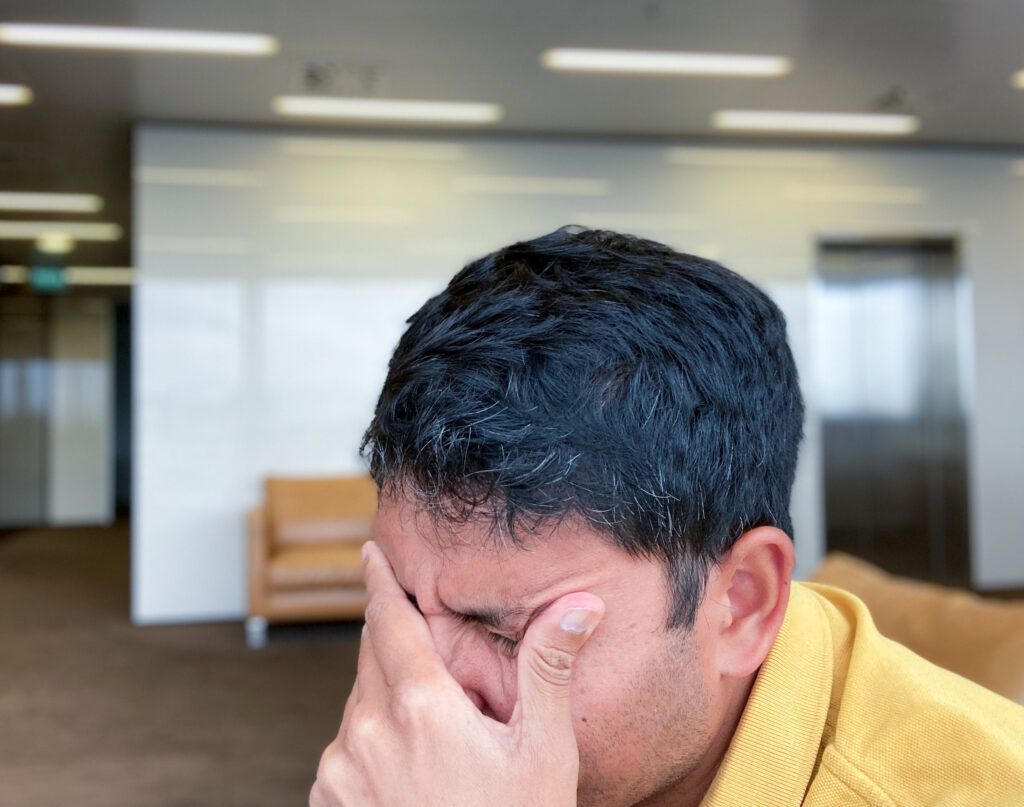Stress causes anxiety, ranging from minor to severe concern or terror. Anxiety is designed by nature to encourage someone to avoid danger. However, in 2023 we perceive danger differently than our ancestors. From our jobs to relationships and even social media acceptance, today’s anxiety can become overpowering and debilitating, prohibiting regular existence. Stress is natural, but an anxiety disorder is an excessive, long-term, or overpowering anxiety.
The main anxiety disorders include generalized anxiety, social anxiety, panic, agoraphobia, particular phobia, and separation anxiety. The most common symptoms are heart palpitations, sweating, shaking, continual worry, dread, and avoidance.
Sadly, millions of people in the US suffer from anxiety and its negative effects. Accordingly, generalized anxiety disorder, social anxiety disorder, and panic disorder are the most prevalent mental health disorders in the US.
Although many people still don’t think anxiety is a severe illness, it is. Here are the worst ways this condition can impact people:

Photo Credits By Unsplash
Increased heart rate
Anxiety raises heart rate and blood pressure.
Anxiety generates stress chemicals like adrenaline, which raise heart rate and blood pressure. The “fight or flight” reaction prepares the body for exercise. Increased heart rate and blood pressure supply more oxygen and nutrients to muscles, preparing them for running or fighting. Yet, continual worry raises heart rate and blood pressure, straining the heart and blood vessels.
Chronic anxiety may damage the heart over time. Hypertension, heart attack, and stroke may result from chronic heart and blood vessel strain. Anxiety hormones may also cause diabetes and obesity.
Anxiety temporarily raises heart rate and blood pressure, but long-term rise may be harmful. See a doctor if your anxiousness persists. They can diagnose anxiety, assess your health, and treat it. Therapy, medicine, and lifestyle adjustments, including exercise, nutrition, and stress management, are examples.
Anxiety weakens the immune system. Chronic stress may weaken the immune system, leaving a person more vulnerable to diseases.
Constipation
Anxiety causes stomach discomfort, nausea, diarrhea, constipation, and acid reflux. Muscle strain, hormone fluctuations, and gastrointestinal motility may induce these symptoms.
“Visceral hyperalgesia” might create stomach troubles from anxiousness. This syndrome causes stomach pain by over-sensitizing abdominal muscles. Anxiety’s stress reaction tenses muscles even more. In addition, this condition may affect the gut microbiota. Stress produces cortisol, which harms gut microbes. Abdominal discomfort, bloating, and diarrhea might result.
Anxious people may have problems swallowing or lose their appetite, causing constipation or malnutrition. In turn, this can slow digestion and cause diarrhea.
In the long run, anxious people may avoid particular meals or mealtimes to prevent panic attacks. Malnutrition and other health issues might result. Therefore, those with digestive troubles should consult a doctor to rule out any underlying illnesses and treat the issue.
Insomnia
Anxiety and insomnia are typically linked in a cycle. This condition activates the natural “fight or flight” response, which releases stress chemicals like cortisol and adrenaline, causing sleeplessness. These chemicals may disrupt the body’s regular sleep-wake cycle, making sleep difficult.
Anxiety may also cause racing thoughts that keep you up at night. Then, worrying about not sleeping might become a self-fulfilling prophecy. This might cause continual hyperarousal, making it hard to relax enough to get a good night’s sleep.
Insomnia makes people fatigued, irritated, and unfocused. This may make managing stress and anxiety difficult, worsening the anxiety condition. After all, sleep deprivation affects mood, memory, and stress. However, there is a solution for anxiety-related insomnia therapy includes:
- Cognitive Behavioral Therapy for Insomnia (CBT-I) changes negative thoughts and behaviors that cause sleeplessness. This treatment treats psychological reasons of sleeplessness and anxiety.
- Benzodiazepines and non-benzodiazepine hypnotics may treat insomnia, but long-term usage is risky.
Meditation, yoga, and deep breathing may help you relax and sleep better. – Maintaining a regular sleep pattern, avoiding coffee, nicotine, and alcohol before bed, and utilizing a comfortable mattress may also alleviate insomnia symptoms.
What are the complications?
Anxiety may worsen or complicate health issues. For example, anxiety increases bodily inflammation, worsening asthma, rheumatoid arthritis, and eczema. In addition, this condition may also affect the immune system, making it harder for your body to fight off infections.
In the long run, anxiety worsens cardiovascular issues. It may raise heart rate and blood pressure, straining the heart and blood vessels and making hypertension harder to treat. Anxiety may also cause psoriasis or eczema flare-ups.

Which are the psychological consequences of anxiety?
Anxiety may harm mental health by:
Overthinking
Anxiety symptoms like excessive worry and rumination may harm mental health. Anxiety is a typical stress reaction, but extreme and chronic anxiety may cause excessive concern and rumination.
The excessive concern involves uncontrolled thoughts about risks or undesirable consequences. These ideas may dominate a person and influence employment, education, and relationships. Excessive worriers have trouble managing their thoughts and may obsess over the same issues. Anxiety, tension, and anguish might result.
Rumination is repeated negative thinking that includes rehashing the same ideas or feelings. Ruminators may obsess about previous errors, regrets, or experiences. Depression may cause rumination and despondency.
Worry and rumination may cause and maintain anxiety disorders. Constant worrying and ruminating may cause weariness, muscular tension, and sleeplessness, making it hard to relax and enjoy life.
Excessive concern and rumination may also lead to depression, prolonging unpleasant ideas.
Trouble focusing
Anxiety causes rapid thoughts and anxiety, making it hard to concentrate. This might make it hard to focus on schoolwork, a job, or even reading or watching TV. Anxious people typically feel cloudy and have trouble remembering things. This also makes it hard to focus in social settings, isolating you.
Concentration issues may also impair learning, memory, and problem-solving. This may impair professional and academic performance. Concentration issues may also lead to frustration and feelings of inadequacy, leading to depression.
Anxiety releases stress chemicals like adrenaline and cortisol, making it hard to concentrate. These hormones may elevate heart rate and blood pressure, making concentration difficult. Anxiety may also create muscular strain, exhaustion, and trouble sleeping among others.
Panic attacks
A panic attack is an unexpected, severe bout of dread or discomfort. Anxiety symptoms like panic attacks may affect a person’s mental and physical health. Stress causes anxiety, but severe and chronic anxiety may cause panic attacks and other problems.
Panic attacks may include fast pulse, perspiration, shaking, chest discomfort, shortness of breath, and thoughts of impending doom. These sensations may be severe and linger for minutes to hours. Panic attacks may arise spontaneously or in reaction to cues like crowds.
Panic episodes might cause people to avoid dangerous circumstances in their everyday lives. This may cause anxiety, solitude, and agoraphobia, a dread of leaving home. Panic episodes may cause insomnia, irritability, exhaustion, and difficulties focusing.
Anxiety-related panic episodes are generally caused by excessive worrying and catastrophizing, or assuming the worst will happen. Genetics, biology, and history may potentially cause panic episodes.
Loneliness
Anxiety-related avoidance behavior is frequent. This may harm a person’s health and quality of life.
Anxiety causes several avoidance behaviors. Avoiding social settings, locations that trigger unpleasant memories, and activities that cause performance anxiety are frequent examples. These actions vary by person and environment.
Someone with a social anxiety disorder could avoid parties, whereas someone with a fear of flight would avoid flying. OCD sufferers may avoid triggers. All of these situations include preventing a condition or action that causes anxiety to decrease or eliminate it.
Avoiding may worsen anxiety. Avoidance of a situation or action increases anxiety. This can lead to a cycle of avoidance, where the individual becomes increasingly anxious about the situation or activity, leading to more avoidance behavior.
Additionally, Avoiding activities can also lead to isolation, disconnection from family and friends, missing out on career opportunities, and limiting the ability to achieve certain goals. It can also make individuals feel like they have lost control over their lives.
Conclusion
In conclusion, anxiety is a serious and potentially dangerous condition for one’s health. Not only can it lead to physical symptoms such as headaches and heart palpitations, but it can also lead to a wide range of mental health problems such as depression, stress, and post-traumatic disorder.
Anxiety can also lead to avoidance behavior, hurting an individual’s overall well-being and quality of life. It can also limit one’s ability to achieve certain goals, isolate them, and disconnect from friends and family.
It is crucial for individuals experiencing anxiety to seek help and treatment, as it can improve their quality of life and prevent the development of more serious mental health conditions.
With the right combination of therapy, medication, and lifestyle changes, individuals can learn to manage their anxiety and live happier and healthier life.
Read also: 8 Beautiful Plants That Reduce Your Stress Levels









